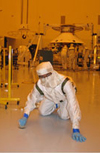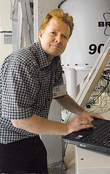|
 |
|
8 Days to SHARES Runaround |
|
Today
10:30 a.m.
Nuclear Engineering
Layered Atom Arrangements in Complex Oxides: Radiation Damage Implications
Kurt Sickafus, Los Alamos Lab
1106 Etcheverry (campus)
12:30 p.m.
CITRIS
Wireless Clouds in the Himalayas
Yahel Ben-David, AirJaldi
540 Cory Hall (campus)
Noon and 1 p.m.
Information Technologies
Berkeley Lab/UC Berkeley Calendar Connection Demo
Mark Rosenberg and Curtis McDonald
Bldg. 50 Auditorium
Tomorrow
10 a.m.
Benefits Office
Garnett-Powers Postdoc Open Enrollment Meeting
Bldg. 50 Auditorium
Noon
Yoga Club
Class with Naomi Hartwig
Bldg. 70-191
1 p.m.
Chemistry Department
High Field Magnetic Resonance in Humans: Theoretical and Experimental Challenges
David Hoult, National Research Council, Canada
D62 Hildebrand Hall (campus)
2 p.m.
Nano Institute
High-Efficiency Light-Emission From Nanoscale Deep-Centers In GaAs For 1.5m Fiber-Optics
Janet Pan, Yale U.
390 Hearst Mining Bldg. (campus)
2 p.m.
Benefits Office
Garnett-Powers Postdoc Open Enrollment Meeting
Bldg. 50 Auditorium
4 p.m.
Chemistry Department
Biosynthetic Inorganic Chemistry
Yi Lu, U. of Illinois
120 Latimer Hall (campus) |
|
 |
|
|
 |
|
| |
Breakfast: Strawberry Cinnamon French Toast with Sausage
Tomorrow's Breakfast: Biscuits and Gravy with Two Eggs
Pizza: Greek
Grill: Beef Quesadilla with Sour Cream and Salsa
Cultural Cuisine: Sweet and Sour Chicken
Deli: Italian Combo
Wild Greens: Salad Nicoise
| B'fast: |
6:30
a.m. - 9:30 a.m. |
| Lunch: |
11
a.m. - 1:30 p.m. |
| Full
menu |
| |
|
|
|
 |
|
 |

Microbes Survive Freeze
For 100,000 Years
By Daniele Fanelli and Maggie McKee
|
|
|
|
 |
 |
|
|
Price |
|
|
|
Microbes can survive trapped inside ice crystals, under 3 kilometers of snow, for more than 100,000 years, a new study suggests. The research bolsters the case that life may exist on distant, icy worlds in our own solar system. Berkeley Lab nuclear scientist and UC Berkeley professor Buford Price has found a mechanism to explain how microbes could survive such extreme conditions. Price says the new work may make the case for life on Mars. Full story.

New Practices Improve
Clean Room Bottom Line
By Laura Peters
|
|
|
|
 |
 |
|
|
Xu |
|
|
|
The days of overbuilding and over-specifying clean rooms may be over, at least if Tengfang Xu, with Berkeley Lab’s Environmental Energy Technologies Division, has anything to do with it. "For every 10 percent increase in airflow rate, there is a 30 percent increase in energy usage by fans, in theory. If facilities scale down to the necessary level needed for contamination control, a great deal of energy cost can be saved." Full story.

Scientists Emphatic:
Global Warming is Real
By H.J. Cummins
Gustavus Adolphus College put a physicist, a geoscientist, an engineer and an economist all in the same room and asked them how to save the Earth's environment, as part of a conference on energy. They all said: Put a price on carbon dioxide. Make it more expensive for industry to continue spewing the greenhouse gases, and clean alternatives will have to follow, said the scientists. They also criticized corn ethanol for the fossil fuel used in growing and processing the corn. After all that, it comes in at just 10 to 20 percent below regular gasoline, said Berkeley Lab Director Steve Chu. Full story.
 |
 |
|
 |
 |

In NASA’s Sterile Areas,
Robust Bacteria Exists
By Warren Leary
|
|
|
|
 |
 |
|
|
NASA clean room |
|
|
|
A recent study has found a surprising diversity of hardy bacteria in a seemingly unlikely place — the so-called sterile clean rooms where NASA assembles its spacecraft and prepares them for launching. Samples of air and surfaces in the clean rooms revealed surprising numbers and types of robust bacteria that appear to resist normal sterilization procedures. Researchers from the Jet Propulsion Lab and Berkeley Lab published the results of their study in the European journal FEMS Microbiology Ecology. Full story.

New NMR Facility Melds
Scientific Disciplines
By Barry Bergman
|
|
|
|
 |
 |
|
|
Pelton |
|
|
|
Lest anyone be tempted to think of Stanley Hall’s giant magnet as a $5 million toy for fun-starved quantitative scientists, Jeff Pelton is eager to set the record straight. Pelton, a spectroscopist who manages the UC Berkeley building’s nuclear magnetic resonance (NMR) facility, takes a decidedly no-nonsense view of the 7-ton, 900 MHz device, which produces a magnetic field of 21 Tesla — 400,000 times that of Earth. Pelton, a guest in Berkeley Lab’s Physical Biosciences Division (PBD), and many of his colleagues have experience with NMR magnets, particularly the facility’s three smaller magnets, which were brought here from Berkeley Lab's Calvin Lab. The NMR facility director is Dave Wemmer, also with the Lab’s PBD. Full story.

Computing Fellowship Program Announced
The Association of Computing Machinery, IEEE Computer Society and SC Conference Series have created the High Performance Computing Ph.D. Fellowship Program. The application deadline is Tuesday, Oct. 30. Complete information, including an application form, can be found here. Funding for the fellowship was aided in part by the extra money earned by the SC05 conference, for which Bill Kramer, NERSC deputy director, served as general chair. Full story.
 |
 |
|
|
|
|
Volunteers Needed To Prep For SHARES
Volunteers are needed to help launch SHARES, Berkeley Lab's charitable giving campaign, which starts Oct. 19. Assistance is needed to put together 4,000 informational packets that will be sent to all Berkeley Lab employees. A collating party will be held Tuesday, Oct. 16, from 10 a.m. to 4 p.m. in Building 90-1099. Free pizza will be provided. Employees interested in volunteering should contact Bharat Parikh (x4009) for more information.
|
|
|
 |
|
|
|
|
 EMERGENCY INFO EMERGENCY INFO |
 |
Emergency: Call x7911
Cell Phones: Call 911
Non-emergency Incident Reporting: Call x6999
SECON level 3
More Information |
 |
|
|
 |
|
|

